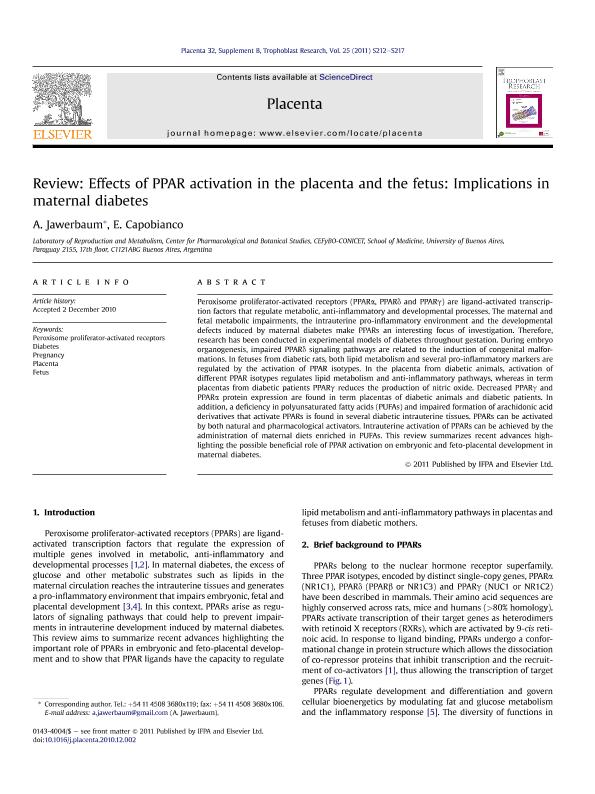Artículo
Effects of PPAR activation in the placenta and the fetus: implications in maternal diabetes
Fecha de publicación:
03/2011
Editorial:
Elsevier
Revista:
Placenta
ISSN:
0143-4004
Idioma:
Inglés
Tipo de recurso:
Artículo publicado
Clasificación temática:
Resumen
Peroxisome proliferator-activated receptors (PPARα, PPARδ and PPARγ) are ligand-activated transcription factors that regulate metabolic, anti-inflammatory and developmental processes. The maternal and fetal metabolic impairments, the intrauterine pro-inflammatory environment and the developmental defects induced by maternal diabetes make PPARs an interesting focus of investigation. Therefore, research has been conducted in experimental models of diabetes throughout gestation. During embryo organogenesis, impaired PPARδ signaling pathways are related to the induction of congenital malformations. In fetuses from diabetic rats, both lipid metabolism and several pro-inflammatory markers are regulated by the activation of PPAR isotypes. In the placenta from diabetic animals, activation of different PPAR isotypes regulates lipid metabolism and anti-inflammatory pathways, whereas in term placentas from diabetic patients PPARγ reduces the production of nitric oxide. Decreased PPARγ and PPARα protein expression are found in term placentas of diabetic animals and diabetic patients. In addition, a deficiency in polyunsaturated fatty acids (PUFAs) and impaired formation of arachidonic acid derivatives that activate PPARs is found in several diabetic intrauterine tissues. PPARs can be activated by both natural and pharmacological activators. Intrauterine activation of PPARs can be achieved by the administration of maternal diets enriched in PUFAs. This review summarizes recent advances highlighting the possible beneficial role of PPAR activation on embryonic and feto-placental development in maternal diabetes.
Archivos asociados
Licencia
Identificadores
Colecciones
Articulos(CEFYBO)
Articulos de CENTRO DE ESTUDIOS FARMACOLOGICOS Y BOTANICOS
Articulos de CENTRO DE ESTUDIOS FARMACOLOGICOS Y BOTANICOS
Citación
Jawerbaum, Alicia Sandra; Capobianco, Evangelina Lorena; Effects of PPAR activation in the placenta and the fetus: implications in maternal diabetes; Elsevier; Placenta; 32; sup. 2; 3-2011; 212-217
Compartir
Altmétricas




